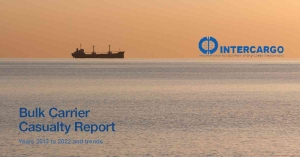


(Posted on 01/08/23)
Cargo liquefaction still remains the greatest contributor to loss of life associated with bulk carrier losses while grounding remains the main cause of ship losses, according to the recently published Bulk Carrier Casualty Report 2013-2022 from INTERCARGO.
The document was submitted to the International Maritime Organization in May, ahead of the 9th session of its Sub-Committee on Implementation of IMO Instruments (III), which takes place at the IMO from 31st July to 4th August and has a key role in casualty analysis and issuing lessons learned from marine incidents.
The Casualty Report provides 10-year information on bulk carrier casualty statistics, looking at trends in casualties in terms of both loss of life and loss of ships, drilling down into the size and age of vessels as well as Flag State performance.
While the report shows a clear trend of improved safety and declining ship losses at a time of fleet growth, it also shows that major incidents involving loss of life are still occurring and the industry must examine why they are still happening - there is no room for complacency.
Operations Manager Xianyong (Joe) Zhou, says: “As the voice of global dry bulk shipping, INTERCARGO is determined to help lead the response to these events. While the Report highlights that improvements are being made in safety, there is still clearly more to do to make shipping safer. We must continue to learn how we can best protect the lives of seafarers as well as the vessels and their cargo from damage and loss.”
The report highlights that between 2013 and 2022, 26 bulk carriers of more than 10,000 deadweight tonnes (dwt) were reported lost, with the tragic loss of 104 seafarers’ lives.
Statistics for 2022 alone show the loss of two bulk carriers, one due to a collision and the other from losing power and sinking in rough seas, with a loss of 12 seafarers from these incidents.
The rolling report also highlights that four of the five bulk carrier casualties, which led to the loss of 70 lives, occurred as a result of cargo liquefaction; four were loaded with nickel ore and one with bauxite.
In terms of ship losses, grounding was the most common reported cause between 2013 and 2022, accounting for 12 bulk carriers lost (46.2%), with various other causes including problems with machinery and equipment.
Learning lessons from incidents and casualties and the sharing of experience have proven to be effective in raising safety awareness and, in addition to the submission of the INTERCARGO Bulk Carrier Casualty Report to IMO every year since 1996, the association has made its voice heard on a number of safety issues at IMO through papers and interventions.
Torvald Klaveness has announced the decision to consolidate all digital services under Klaveness Digital... Read more
The International Association of Dry Cargo Shipowners (INTERCARGO) has renewed its call for straightforward... Read more
The Swedish Club has delivered strong results for 2024, posting a USD 34 million profit and significantly... Read more
In line with NORDEN’s positive long-term outlook for Capesize freight rates, the company have... Read more
OrbitMI, a global provider of maritime software and data products, has expanded its workflow capabilities... Read more
Current ClassNK Senior Vice President Hayato Suga has been appointed as President & CEO as well... Read more
The surge in demand for Cape Size bulk carriers will continue for another six weeks, driven on by increased... Read more
OrbitMI, a leading provider of maritime SaaS software, has announced that Istanbul-based Statu Shipping... Read more
“The International Association of Dry Cargo Shipowners (INTERCARGO) is deeply saddened by the... Read more
As the shipping industry continues its transition to carbon-neutral fuels, ammonia and hydrogen are... Read more